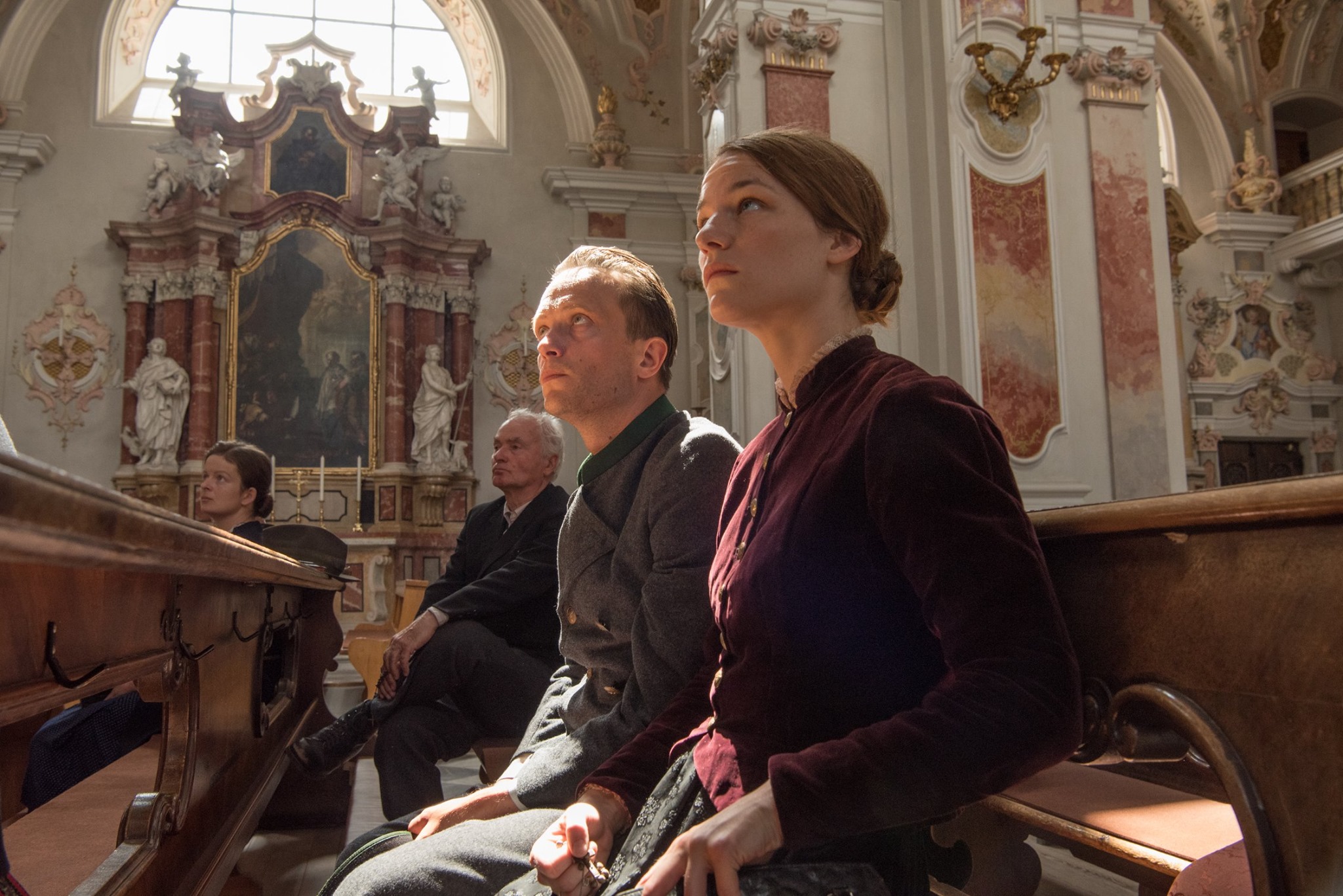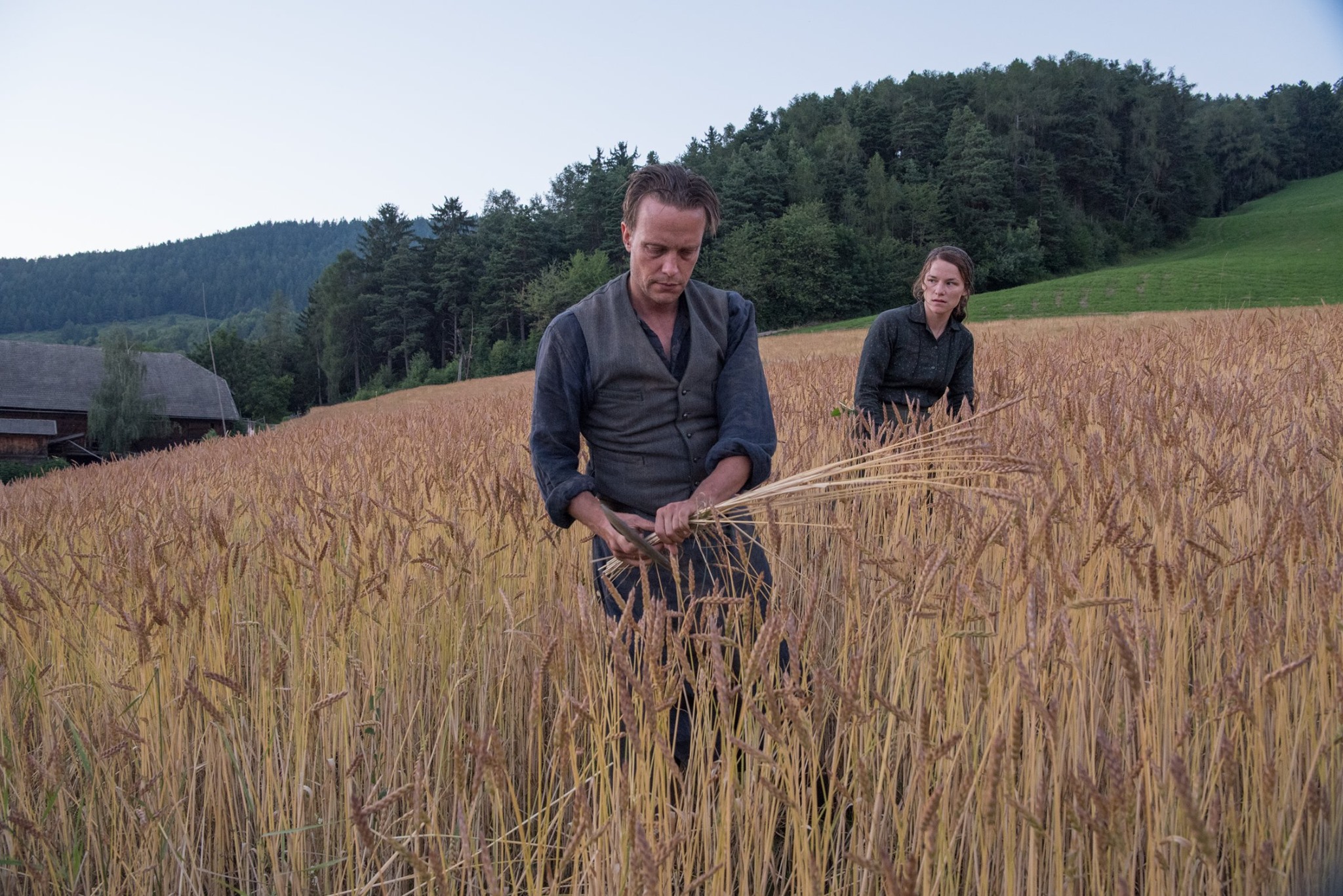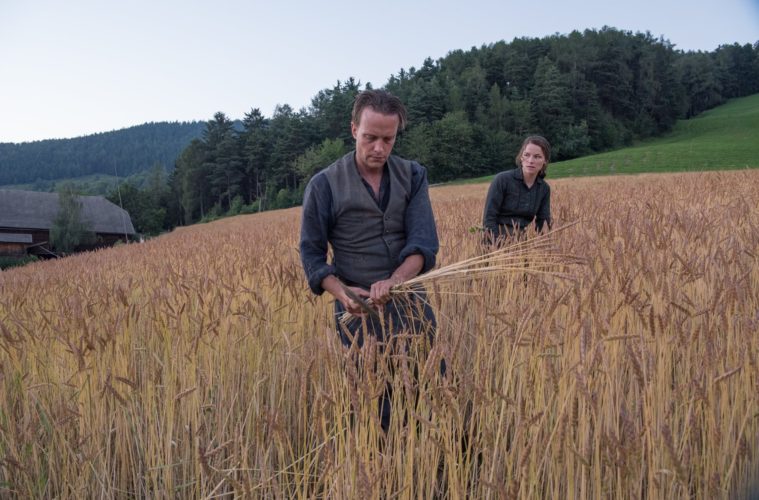Terrence Malick’s A Hidden Life is a satisfyingly exhausting experience, an ode to Catholicism in which the viewer is asked to take a moral inventory throughout its three-hour runtime. August Diehl and Valerie Pachner play Franz and Fanny Jägerstätter, respectively, a husband and wife in the alps of Sankt Radegund who are forced by Hitler’s annexation of Austria—and their unwavering Christian conviction—to reject Nazism, and thus lose Franz to a ruthless military trial at the Reichskriegsgericht in Berlin-Charlottenburg on July 6, 1943. He was accused of undermining military morale and executed by guillotine on August 9th of that year. The family was hated in their time but have since become moral exemplars. Franz was even declared a martyr by Pope Benedict XVI and declared a saint.
“A Hidden Life is an invocation, the wrenching and unheeded plea of a man struggling to preserve his humanity intact as the world around him plunges deeper into evil, and worse, watches motionless and indifferent as said evil blossoms, spreads, and becomes normalized,” Leonardo Goi said in our Cannes review.
Ahead of the film’s limited release starting this week, we spoke with Diehl and Pachner about learning farm work as their preparation for the A Hidden Life, Terrence Malick’s shooting process in regards to thinking about the editing, Franz and Fanny’s vocation of marriage that helped them reject Nazism, the perversion of pastoral values into jingoism, and how the actors took their own moral inventory while making the film.
The Film Stage: How did you prepare for A Hidden Life?
August Diehl: We had their letters. I actually have to recommend this because it’s very nice to read the letters between Fanny and Franz Jägerstätter. Both of us used the letters as the basis of how we approached the whole thing. We had a lot of talks with Terrence, a lot of sharing thoughts. And of course, then, the physical labor learning how to use these tools. We met a group of farmers who had this little community where they were teaching people how to use the old tools, to bring it back to the people. They taught us and were very strict, but they helped us a lot. I had the feeling the whole movie was more of a search and a journey, like we were invited to search with Terrence. It wasn’t like in other movies where you prepare yourself completely, this was more about finding it while shooting it. I appreciate it a lot because it had much to do with Terrence’s character, as well, that he was very open and inviting us to contribute whatever we could do to find the story and find the movie.
Valerie, most of the movie you’re doing manual labor. Did it feel like shooting a movie or were you living it?
Valerie Pachner: Definitely the latter. As August said, we did a lot of farm work. You really concentrate more on the farm work than the acting. Which allows you to dive into the story and into their lives. For me, it felt like it grounded the character, literally connected to the earth. That is essential to them because their faith and the decisions they made came from a grounded place; it came from their feeling of connectedness with nature. That was important we could have this physical approach to the characters.
Your characters have this fidelity to one another that’s as grounded in Catholicism as it’s grounded in their love. It’s a vocation to marriage, in the religious sense. Do you think their marriage springs from their faith or does their faith spring from their marriage?
Diehl: Faith is always something different for each person. I feel it’s not so much about religious people, although they were very Catholic. As Valerie said, it’s a religion that comes very much out of natural feeling. I always thought Franz and Fanny were seeing the bread that lands on their table as coming from the ground and they were going through the whole process of creating it. This creates a faith but in a very simple way. The simplicity of the whole thing was very strong. Being connected to the ground they can see very easily what is right and what is wrong.
Pachner: Back at that time it was unusual for farmers to really be in love, but they were. I think their experience of such true love reinforces their gratitude. Their love was simple but deep. You see it in the letters, you can feel that they really loved each other but they were just farmers, so they didn’t talk about it very specifically.
Diehl: I always had the feeling the moment when a problem comes or conflict comes, then you know if you believe or not. I think their faith is increasing in the moment of the problem. And also the love. It’s both.
Pachner: If there wasn’t that challenge they probably wouldn’t come to the point of true feeling, really believing, and really loving.

What you’re talking about is a pastoral image of life, a common image in Christianity. In the film we see an inversion of pastoral values; it becomes jingoism, it becomes National Socialism. These values purport to bring power back to the people, people like the simple farmer. It’s a perversion of the values Fanny and Franz live by.
Diehl: They are connected, and I find that very intelligent in the whole movie how Terry turns this upside down. Blood and soil and all this, you can turn it around and it becomes something very simple and very clear, and then you’re not killing people anymore. With Jägerstätter’s values you would never kill anyone.
There are a few scenes where your characters are in conversation. One would speak and both of you would be in the field and when the other responds you’re both in a barn. Would you film the entire conversation in multiple places and they edit it together in such a way?
Pachner: Oh yeah, we did many of the scenes several times. We would do the same scene in the barn and the field. It gave Terry this wide-range of material of the same scene in different moments he picked. The editing is such an important part of the whole film and Terry’s whole process in general. It gave us so much freedom to explore a scene without preparing it to death.
Diehl: We were also talking about how it gives us time. All the urban people are talking fast, “click-clack-click-clack.” I remember Terry saying it’s actually nice that Fanny says something in the morning and at noon Franz is answering in the field. In the evening she’s answering again. That brings something that we’re losing in our society, to go inwards, to feel what you’re thinking and then answering. But it takes time and one dialogue that’s only three sentences could go through the whole day.
Pachner: There are certain qualities to that slower pace that I think those characters breath because they’re not twittering into the world. It’s quiet and calm and very considerate because only then can you go through the decision they make based on the truth inside of you.
One of the narratives that emerged around A Hidden Life is it’s more linear and structured than Malick’s last three movies. Did it feel like that while shooting it?
Diehl: We were always aware of the fact that this is a story which is very simple and has a very clear red line. It’s based on true events so we knew we could only go so far.
Pachner: You have the structure and strong narrative and I think that’s good. That’s probably why people are calling the movie more linear than his previous work. But the process itself, this was our first Terrence Malick movie so we don’t know how it was before. This process is very free. We both at first had this feeling of, “Who is my character and how are they built?” But I felt in the first week I could just forget that stuff, I didn’t have to care.
Diehl: But it also gave us security. I imagine if we had to find the story, not only moments, maybe I would have been more nervous. As I knew this was a very clear frame, then you know which direction it has to go, so it makes you feel secure in your work and you trust in the project.

Knowing where the story was heading, it made me do moral inventory while watching the movie. I was thinking about the wrong things I do and the right things I don’t do. Did working on this project make you do your own moral inventory?
Pachner: As an actor you try to get close to your character, you try to understand. You do–especially with this film, because we were living it–try to put yourself in their shoes and, yes, I ended up questioning myself. For me, the very intense thing was trying to be close to Fanny as she puts her needs behind a higher morality. That was astonishingly strengthening. Although there’s so much hardship she has to go through, in the end, it empowers you in a weird way. You feel like whatever the odds are, however the world is working, I know what I want and I follow that.
Diehl: Now that I’m looking back, it helped a lot that we more or less shot the whole movie chronologically. I remember that I was a different person at the beginning of it. Shooting the farmwork, the children, and the family life. Later on in the prison, I knew I couldn’t come back to nature and the farm, and I was really missing it. It took me on a journey that went from A to B. It helped a lot to feel the solitude and miss home, because otherwise I wouldn’t have this feeling. Normally you start a movie at the end or the middle, but this was like giving myself away to the story and an experiment to let it happen.
How did the environment you shot in shape your performance?
Diehl: The surrounding was actually the main character, we were the green screen. [Laughs.]
Pachner: Nature is talking, too. Not only our interaction with it, but you see it in the film. It was so important for the characters to be strongly connected to nature. I remember I would visit August on set when they shot the prison scenes. For this one scene where we see each other again I remember how it informs my character in a different way when he was dressed in a prison uniform. On the farm I didn’t have to pretend to be a country bumpkin because I really was put out of my usual surroundings.
What was it like to film a war movie that didn’t have images of war?
Diehl: It wasn’t a war movie for us. We had the feeling that war is coming to our valley.
Pachner: I feel like that’s a reality how most people experienced the war, especially women. There’s a truth to you don’t have to stand on a battlefield to feel the war. It’s more like this power from the outside that’s being put on their lives. They didn’t want to be rebellious, it was imposed on them.
Diehl: It was a decision that was not there, it was just slowly coming. It was a rejection of Nazism at first, then it transformed into not accepting the oath, and then it became bigger and bigger. Until the very end, they were full of doubts. It was an inner battle. We have so-called heroes, but at the moment it’s happening they’re not aware they’re being heroes. It was a complicated, crazy fight until the very end, for Franz to be aware his children were never going to see him again. You can argue if Franz made the right choice. I think although he was a farmer and maybe simple, he was not stupid. He was really thinking this through. Therefore, even more, it’s crazy that his wife was so close to him the whole time. She asked once why he was doing this and she said, “If I’m not there he has no one. He would be alone.”
A Hidden Life opens in limited release on December 13 and will expand wide in January.

